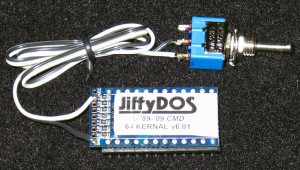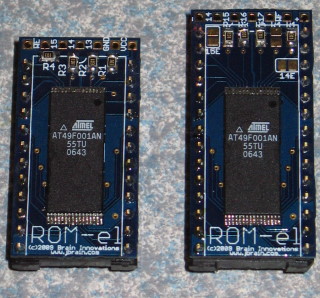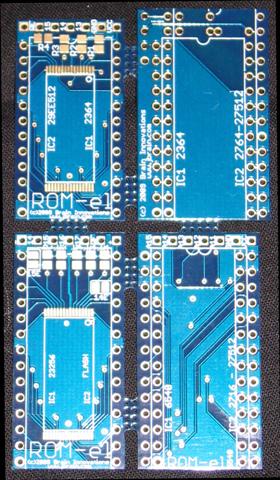As announced this afternoon at World of Commodore 2012, RETRO Innovations has acquired the rights to offer Click Here Software’s port of JiffyDOS for the Commodore VIC-20, C16, and +4 machines, thus completing the set of JiffyDOS KERNAL replacement offerings. Within the next few days, the KERNAL replacements and image files will be available in the online store for sale. Many thanks for those customers who kept asking for the versions, as that helped show that demand still exists for these versions of JiffyDOS.
Tag: JiffyDOS
Cincinnati Commodore Computer EXPO
Many apologies for the lack of postings, but I was preparing for the Cincinnati Commodore Computer Club EXPO (C4 EXPO), which happened over Memorial Day weekend, and I am just now getting caught up on postings.
Two weeks prior to the show, I shifted all focus to ensuring newly produced products would be available at the show. X-Pander3 expansion boards and 64NIC+ network cards were in production, but delivery had been delayed a week or so. This seems to always happen prior to a show, without fail. I spent evenings obtaining manufacturing and shipment statuses, making last minute parts purchases, and packing for the show.
The week prior to the show was spent traveling to Ohio, taking in some sights (Kings Island, for example), and spending time with the family. Since we were already on the road, I rescheduled last minute product shipments from China to arrive at the hotel before the show.
Though not the only reason, it is true I offer products for sale to finance these trips. I can enjoy catching up with old and online friends and relaxing and enjoying the hobby. This year was no different. I arrived mid afternoon on Friday, with the show room already open and a few folks setting up systems. Over the years, I’ve learned how to pack lighter, so my tables didn’t take too long to setup. Then, I spent time finishing some products for the show and chatting with the early arrivals.
I called it quits early Saturday morning (1AM or so Central), getting back to the room before 9:30AM. Traffic was lighter than usual, and seemed light all day. Sales were nominal, but steady. JiffyDOS sales were hampered by issues with my Willem programmer (after I returned home, I determined the configuration switches were faulty), preventing me from flashing some of the JiffyDOS versions.

Traffic stayed light all day, which is a bit disappointing because this is the second year traffic has been light. By afternoon, sales dissipated and I spent time fighting with the programmer. Oliver VieBrooks (Six of Style) came over late afternoon and we brainstormed on project ideas. Thus began the prototyping portion of the show. Given that sales had stopped, I decided to start on a project right then, and continued through the normal annual Saturday “C4 EXPO Golden Corral” dinner period (to be fair, I probably would have went, but we’d already enjoyed GC as a family earlier in the week).
Later in the evening, I worked on a project for Leif Bloomquist. Since the Fall ECCC ’09 show, Leif and I have been working to bring his VIC-20 MIDI cartridge to fruition. The main issue with the original design is the UART utilized, a MC6850 that is hard to source and pricey. I suggested rewriting the drivers to use the much more common 16X50-style PC UART ICs. I’d source a batch of them, but still needed to wire up one to Leif’s board so he could test.
By Sunday, I was out of energy, having worked on two prototypes the previous night. Thus, I packed up and left without much fanfare.
Seeing friends and talking hobby is always nice, but I feel the Memorial Day slot for this show hurts it quite a bit. Traffic was light, as previously noted, and sales were likewise light. Surprisingly, the Louisville crowd didn’t show, which hurt attendance more.
JiffyDOS Images Added
 The following JiffyDOS images have been added to the online store:
The following JiffyDOS images have been added to the online store:
- C128D (C128 KERNAL, C64 KERNAL, and 1571D DOS)
- 1541 DOS
- 1541-II DOS
Soon to be added:
- 1571 DOS
- 1581 DOS
JiffyDOS Production Units

After many months of preparation, JiffyDOS production ROM overlays are finally ready for distribution. The system utilizes the ROM-el FLASH-based ROM emulator, allowing the units to be fully assembled before programming. Units should be available shortly for sale in the online store. Click on the picture for a larger view.
Online Store Active!
I tried a few, but decided this one was simple enough to meet my needs, yet flexible enough for the items I have to sell. I hope to add my full inventory over the next few weeks.
ROM-el testing complete

Aries was backordered on the required 24 and 28 pin headers needed to finish testing, and the order just came in this past week. Thus, I finally had a chance to solder and test the units. Testing went well, and I can program the units with my Willem programmer. Originally designed to hold a 29EE512 64kB EEPROM, I found a good price on Atmel AT49F001 128kB 5V Flash, so I made the necessary adjustments and tested with the new memory. Testing went well, so I am releasing the design to production.
I have noticed one issue that I need to address. Some CBM units have an RFI shield that doubles as a heat shield. To perform the latter function, metal “fingers are stamped out of the shield that press on the top of the ICs. I need to ensure the metal shield/heat sink does not contact any of the pins on this unit.
ROM-el test boards

The PCB house shipped the first two ROM-el boards for inspection and testing. Once they are assembled and testing, I will release the design to production.
As one can see, the PCB is a merged set of 4 designs. The tabs between the designs are designed to be broken, separating the individual units after assembly.
ROM-el in production!
I’ve initiated phase 1 of ROM-el production, scheduling the PCB design for production and shipment. ROM-el will be completed in 3 phases:
- PCB manufacture and shipment of 2 bare boards
- Manual assembly and testing
- Release PCB for assembly and shipment
This is typical for new designs, for the following reasons:
- Given the low cost of production boards, it’s cheaper to make a production board run instead of an initial prototype board run. In the best case, the board is operational and no prototype board costs are incurred. At worst, the board must be “spun” once more, but the total cost does not exceed a prototype + production run cost.
- Shipping 2 boards ahead of time permits verification of the design before assembly. The boards are shipped at no cost by “piggybacking” them on a previous order that is nearing completion.
Normal turnaround is 10 business days (2 calendar weeks), so I expect boards around July 12th.
To save costs in creating the SMT stencil and the boards themselves, I “merged” 4 designs into one set of files for the PCB house using Gerbmerge. I struggled to install the program in Windows, which was unsucessful. The application has some dependencies, one of which requires a C compiler. The Windows install of the dependency assumes Visual C++, which I do not own. After wasting a few hours, I installed on the local Linux server, which was trivial. The application is very straightforward, and I was able to create a minimal merged set of files in a few minutes. Thus, I will be receiving 100 units of:
- ROM-el 2364
- ROM-el 23128/23256
- 2364Adapter (simple DIP style 24-28 pin adapter
- 6540Adapter (CBM-Hackers folks asked for this design, which has not been tested)
JiffyDOS Licensing
 As announced at the C4 EXPO, I am working with Mark Fellows (Highland IT Solutions) to finalize a licensing agreement for ‘JiffyDOS’ ROM Overlay manufacture and distribution. In addition to hardware ROM enhancement units, I will also offer image downloads for 1541 Ultimate, C64DTV, and emulator users, as well as an amnesty offering for unlicensed copies.
As announced at the C4 EXPO, I am working with Mark Fellows (Highland IT Solutions) to finalize a licensing agreement for ‘JiffyDOS’ ROM Overlay manufacture and distribution. In addition to hardware ROM enhancement units, I will also offer image downloads for 1541 Ultimate, C64DTV, and emulator users, as well as an amnesty offering for unlicensed copies.
To minimize manual manufacturing processes inherent in the current EPROM-based JiffyDOS offerings, my goal is to utilize the ROM-el EEPROM/FLASH solution for JiffyDOS hardware offerings.